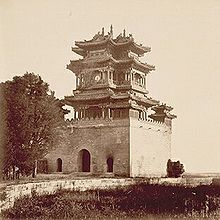- Chrétien-Louis-Joseph de Guignes
-
Chrétien-Louis-Joseph de Guignes (1759–1845) was a French merchant-trader, ambassador and scholar. He was the son of French academician and sinologue, Joseph de Guignes. He learned Chinese from his father, and then traveled to China where he stayed for the next 17 years and returned to France in 1801.
Contents
At court of the Qianlong Emperor
In 1794-95, de Guignes served as interpreter for Isaac Titsingh, the Dutch ambassador to the court of the Qianlong Emperor of China.[1]
Titsingh travelled to Peking (Beijing) for celebrations of the sixtieth anniversary of the Emperor's reign. The Titsingh delegation also included the Dutch-American Andreas Everardus van Braam Houckgeest[2], whose description of this embassy to the Chinese court were soon published in the U.S. and Europe. In the year following the emperor's rebuff to the British mission headed by Lord George Macartney, Titsingh and his colleagues were much feted by the Chinese because of what was construed as seemly compliance with conventional court etiquette. The members of the Titsingh mission, including de Guignes, were the last European diplomats to savour the mid-winter splendor of the vast Summer Palace (the Yuangmingyuan, now known as Old Summer Palace) before its destruction by the Lord Elgin's troops during the punitive Second Opium War in 1860.[3]
In 1808, de Guignes published his account of the Titsingh mission, which provided an alternate perspective and a useful counterpoint to other reports which were then circulating.[4] Neither the Europeans nor the Chinese could have known that the Titsingh embassy would turn out to have been the last occasion in which any European appeared before the Chinese Court within the context of traditional Chinese imperial foreign relations.[5]
Sinologist
In 1808, Napoleon ordered de Guignes to prepare of a Chinese-French-Latin dictionary. The work was completed five years later. Shortly after the publication, it was discovered that the dictionary was nothing more than a copy of an older work coposed by the Franciscan friar, Basilio Brollo of Gemona (1648-1704). While de Guignes had altered the original by arranging the characters according to the order of the 214 radicals (as contrasted with Basilio's tone-based order), the dictionary received strong criticism in 1814 from the first person to be appointed to be a professor of Chinese at a European institution of higher learning, Jean-Pierre Abel-Rémusat (1788-1832).[6] Despite any controversy, de Guignes was elected a member of the Institut de France in the Académie des Sciences (Géographie et Navigation) and of the Académie des Inscriptions et Belles-Lettres.
Works
- de Guignes, C.-L.-J. (1813). Dictionnaire Chinois, Français et Latin, le Vocabulaire Chinois Latin. Paris: Imprimerie Impériale.
- ____________. (1808). Voyage a Pékin, Manille et l'Ile de France. Paris: Imprimerie Impériale.
Notes
- ^ Duyvendak, J.J.L. (1937). 'The Last Dutch Embassy to the Chinese Court (1794-1795).' T'oung Pao 33:1-137.
- ^ van Braam Houckgeest, Andreas Everardus. (1797). Voyage de l'ambassade de la Compagnie des Indes Orientales hollandaises vers l'empereur de la Chine, dans les années 1794 et 1795; see also 1798 English translation: An authentic account of the embassy of the Dutch East-India company, to the court of the emperor of China, in the years 1794 and 1795, Vol. I.
- ^ van Braam, An authentic account..., Vol. I (1798 English edition) pp. 283-284.
- ^ de Guignes, C.-L.-J. (1808). Voyage a Pékin, Manille et l'Ile de France. Paris.
- ^ O'Neil, Patricia O. (1995). Missed Opportunities: Late 18th Century Chinese Relations with England and the Netherlands. [Ph.D. dissertation, University of Washington]
- ^ Zurndorfer, Harriet Thelma. (1995) China Bibliography: A Research Guide to Reference Works about China Past and Present. New York.
References
- van Braam Houckgeest, A.E. (1797). Voyage de l'ambassade de la Compagnie des Indes Orientales hollandaises vers l'empereur de la Chine, dans les années 1794 et 1795. Philadelphia: M.L.E. Moreau de Saint-Méry.
- ___________. (1798). An authentic account of the embassy of the Dutch East-India company, to the court of the emperor of China, in the years 1974 and 1795, Vol. I. London : R. Phillips. [digitized by University of Hong Kong Libraries, Digital Initiatives, "China Through Western Eyes." ]
- Duyvendak, J.J.L. (1937). "The Last Dutch Embassy to the Chinese Court (1794-1795)." T'oung Pao 33:1-137.
- O'Neil, Patricia O. (1995). Missed Opportunities: Late 18th Century Chinese Relations with England and the Netherlands. [Ph.D. dissertation, University of Washington]
- Rockhill, William Woodville. "Diplomatic Missions to the Court of China: The Kotow Question I," The American Historical Review, Vol. 2, No. 3 (Apr., 1897), pp. 427-442.
- Rockhill, William Woodville. "Diplomatic Missions to the Court of China: The Kotow Question II," The American Historical Review, Vol. 2, No. 4 (Jul., 1897), pp. 627-643.
Categories:- 1759 births
- 1845 deaths
- French diplomats
- French orientalists
- Members of the Académie des Inscriptions et Belles-Lettres
- Members of the French Academy of Sciences
Wikimedia Foundation. 2010.


